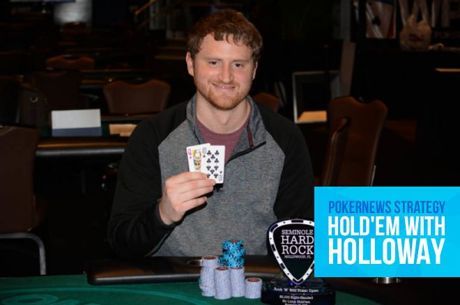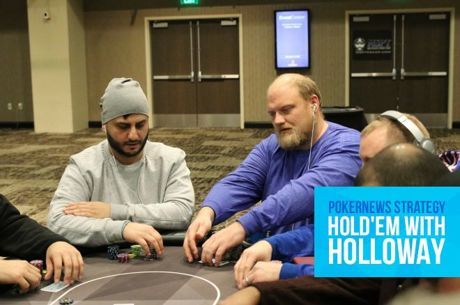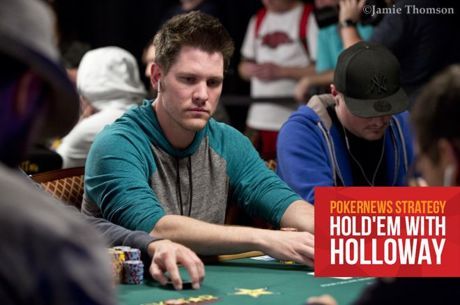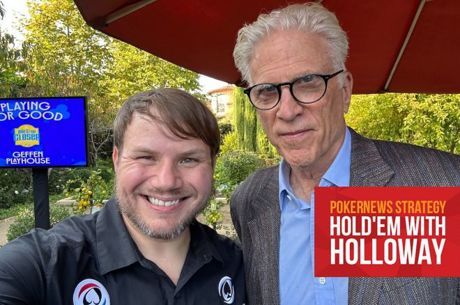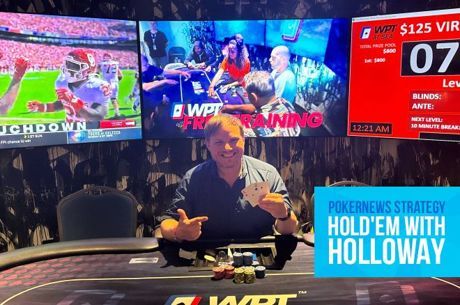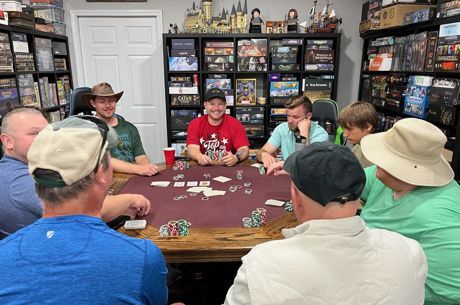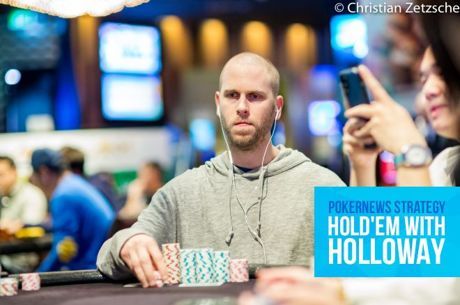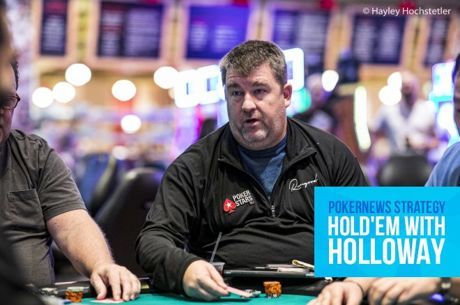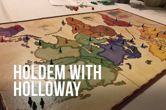Hold'em with Holloway, Vol. 92: My Upstuck Diagnosis by the CLC Squad
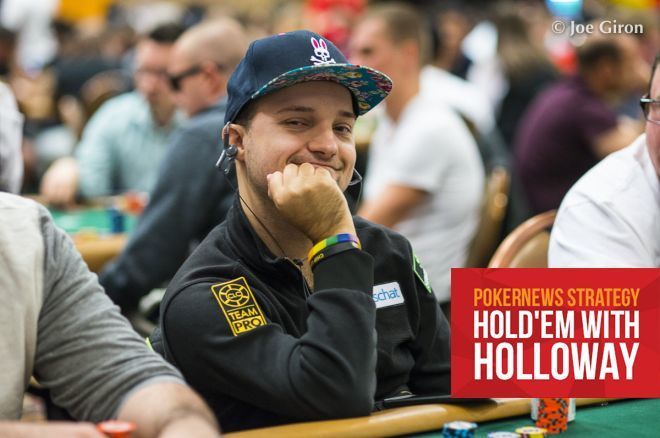
I was fortunate enough to win $1,040 in a recent $5/$10 pot-limit Omaha cash game. Not a bad win, but I was angry/tilted/frustrated because an hour earlier I was up $2,250. I'm sure many of you can relate to the feeling of being up a good chunk and then either losing some or all of it back.
Sometimes when a player is stuck big, say $500, and then claws back to even, it can feel better than actually booking a win. It never ceases to amaze me what seemingly contradictory emotions �� e.g., feeling like a loser when you're winning, or feeling like a winner by breaking even �� poker can evoke.
"Being upstuck isn't a great feeling, but it becomes a non-factor for those confident in their skills."
Fortunately, there's a name for what I experienced and I was diagnosed by two experts from Chip Leader Coaching.
"That's called being 'Upstuck' and pretty much everyone experiences it," WSOP bracelet winner Ryan Laplante said when I told him how I was feeling.
"It is your ego lying to you about deserving to win," Laplante explained. "The way you deal with it is focus on decisions and not results. Play well equals winning. Play poorly equals losing. Money is just a way to keep score in the game."
I also had the chance to chat with CLC co-founder John "KasinoKrime" Beauprez about it.
"I feel it constantly. Poker, and life for that matter, is all about expectations," said Beauprez, who like Laplante is a WSOP bracelet winner. "If you're the chip leader of a tourney and then you lose half your stack but still have an above average stack, you feel short."
"If you are on life support and double up, it feels like a mountain since mentally you were already preparing to bust out (probably thinking about who is going to give you a ride home, what's for dinner, etc.)," he continued. "For me personally, I really do my best to focus on grading myself on how well I play - not on any type of results."
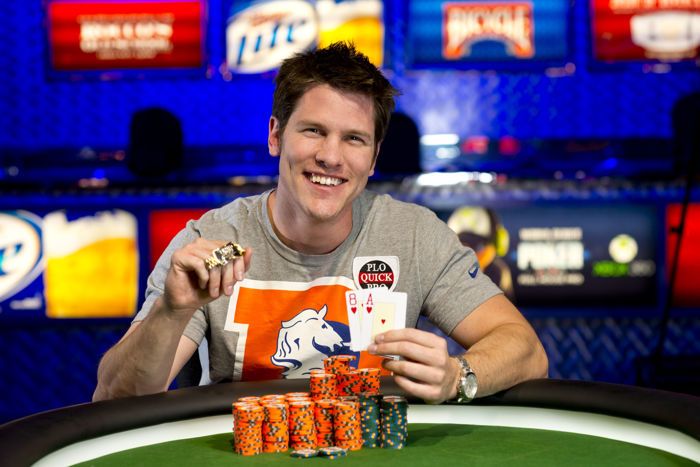
To do that, Beauprez keeps what he calls his "performance journal" in which he writes after every session.
"I use metrics which aren't tied to results to grade my play," he explained. "So actually, a lot of losing sessions I've had have the highest rating because of my focus level, mental state of tilt, etc."
One hand I recently watched play out and felt was indicative of what Beauprez was preaching took place on the bubble of the MSPT Season 9 finale at Canterbury Park �� which coincidentally was won by CLC student Andy Rubinberg for his second MSPT title.
It happened when Wisconsin's Larry Ormson opened for 15,000 from the hijack and the button flatted. Brad Sailor, another CLC student, came along from the big blind and the trio saw a flop of 9?J?10?.
Sailor checked, Ormson bet 20,000, and the button folded. Sailor woke up by check-raising all in and Ormson called off for 66,000 total.
Ormson: Q?Q?
Sailor: K?7?
Ormson got it in good with an overpair and open-ended straight draw, but Sailor had the flush draw with a gutshot. The 5? turn gave Sailor the flush and left Ormson drawing dead headed to the river, which was the meaningless K?.
Ormson fell one spot shy of making a minimum payday of $2,271 and was understandably disappointed. However, in my opinion, this was one of those spots Beauprez was talking about. Ormson played it right at the time in my opinion. Even though the outcome wasn't what he wanted, Ormson could take solace in the fact he got it good.
In terms of being upstuck in my PLO game, my angst was relieved after talking it over with the pros. I was happy with my play in what was a great game with lots of players giving away money, which meant leaving earlier probably would've been the mistake. And even though I didn't win as much as I hoped, it was still a solid bankroll boost.
Being upstuck isn't a great feeling, but it becomes a non-factor for those confident in their skills. Do the right thing, do it all the time, and you have nothing to be ashamed of.
In this Series
- 1 Hold��em with Holloway, Vol. 1: Making Reads and Trusting Them
- 2 Hold��em with Holloway, Vol. 2: Playing in Poker Charity Events
- 3 Hold��em with Holloway, Vol. 3: Throttle Back Before You End Up Punting
- 4 Hold��em with Holloway, Vol. 4: Punish the Satellite Bubble
- 5 Hold��em with Holloway, Vol. 5: What is Proper Accumulator Strategy?
- 6 Hold��em with Holloway, Vol. 6: A Chip and a Chair Story with ��SirWatts��
- 7 Hold��em with Holloway, Vol. 7: 15 Things About Poker I Wish I��d Known Sooner
- 8 Hold��em with Holloway, Vol. 8: Examining the Largest Overlay in Poker History
- 9 Hold��em with Holloway, Vol. 9: Differences Between Rebuys and Reentries
- 10 Hold��em with Holloway, Vol. 10: Five Must-Read Poker Books of 2014
- 11 Hold��em with Holloway, Vol. 11: When Will You Finally Break Through?
- 12 Hold��em with Holloway, Vol. 12: Dealing with a Target on Your Back
- 13 Hold��em with Holloway, Vol. 13: Knowing When to Call It Quits
- 14 Hold��em with Holloway, Vol. 14: Embarking on a Year-Long Weight Loss Journey
- 15 Hold��em with Holloway, Vol. 15: Navigating Multiple Decision Points in a Poker Hand
- 16 Hold��em with Holloway, Vol. 16: Chris Moorman Tells Me How Badly I Play Poker
- 17 Hold��em with Holloway, Vol. 17: Richard ��nutsinho�� Lyndaker on Getting It in Marginal
- 18 Hold��em with Holloway, Vol. 18: Getting Inside the Head of Poker Pro Brian Rast
- 19 Hold��em with Holloway, Vol. 19: Stupid Calls & Lucky Draws in MSPT WI Championship
- 20 Hold��em with Holloway, Vol. 20: Talking Ante-Only Strategy with Greg ��FossilMan�� Raymer
- 21 Hold��em with Holloway, Vol. 21: Contributing to Jonathan Little��s New Book
- 22 Hold��em with Holloway, Vol. 22: Consequences of Acting Out of Turn & Tossing in Chips
- 23 Hold��em with Holloway, Vol. 23: When It Comes to Chops, Do What��s In Your Best Interest
- 24 Hold��em with Holloway, Vol. 24: Accepting Bad Beats & Lessons in Selling Action
- 25 Hold��em with Holloway, Vol. 25: Heinz�� Ace-High Call Shows Why He's a World Champ
- 26 Hold��em with Holloway, Vol. 26: Is Keeping the Short Stack Alive Collusion?
- 27 Hold��em with Holloway, Vol. 27: Great Laydown or Bad Fold on Poker Night in America?
- 28 Hold��em with Holloway, Vol. 28: Calling Hellmuth with Jack-Deuce Offsuit
- 29 Hold��em with Holloway, Vol. 29: The Philosophy of "No-Chop" Chad
- 30 Hold��em with Holloway, Vol. 30: Preparing to Play the World Series of Poker
- 31 Hold��em with Holloway, Vol. 31: Staying on Your Grind at the World Series of Poker
- 32 Hold��em with Holloway, Vol. 32: The Perilous Decision to Call Off with Ace-Queen
- 33 Hold��em with Holloway, Vol. 33: Using Poker Skills in Reality TV Competitions
- 34 Hold��em with Holloway, Vol. 34: Esfandiari Explains How to Recover from Bad Beats
- 35 Hold��em with Holloway, Vol. 35: Tilly vs. Brunson in Super High Roller Cash Game Hand
- 36 Hold��em with Holloway, Vol 36: Unconventional Play Leads to Good WSOP Main Event Start
- 37 Hold��em with Holloway, Vol. 37: Lessons in Pot-Limit Omaha Hi-Low w/ Evan Jarvis
- 38 Hold��em with Holloway, Vol. 38: Things to Say and Do When You Bust a Poker Tournament
- 39 Hold��em with Holloway, Vol. 39: How Much Did I Have to Raise to Get You to Fold?
- 40 Hold��em with Holloway, Vol. 40: Practicing Patience in My Deep PPC Poker Tour Run
- 41 Hold��em with Holloway, Vol. 41: Analyzing a Questionable SHRPO Main Event Hand
- 42 Hold��em with Holloway, Vol. 42: Analyzing the Play of Neymar Jr. at EPT Barcelona
- 43 Hold��em with Holloway, Vol. 43: The Value of a Reliable Poker Reputation
- 44 Hold��em with Holloway, Vol. 44: John ��KasinoKrime�� Beauprez Rips My PLO Game Apart
- 45 Hold��em with Holloway, Vol. 45: Satellite Dilemmas -- To Call or Not to Call
- 46 Hold��em with Holloway, Vol. 46: Seiver Leverages the River in Super High Roller Bowl
- 47 Hold��em with Holloway, Vol. 47: What Untraditional Moves in Poker Might Mean
- 48 Hold��em with Holloway, Vol. 48: Thinking About the Future with Sam Grizzle
- 49 Hold��em with Holloway, Vol. 49: WCOOP Champ ��Coenaldinho7�� Offers Up His Biggest Hands
- 50 Hold��em with Holloway, Vol. 50: The Peril of Shoving Weak Aces
- 51 Hold��em with Holloway, Vol. 51: The Importance of Not Giving Up in Poker Tournaments
- 52 Hold��em with Holloway, Vol. 52: Does Asking ��Check�� Actually Constitute a Check?
- 53 Hold��em with Holloway, Vol. 53: Thomas Cannuli Impresses Even After Main Event Bustout
- 54 Hold��em with Holloway, Vol. 54: Dealers Aren��t Always Right
- 55 Hold��em with Holloway, Vol. 55: Don��t Get Married to Pocket Aces
- 56 Hold��em with Holloway, Vol. 56: Bazeley��s Survival Instinct Leads to Continued Success
- 57 Hold��em with Holloway, Vol. 57: Playing ��Deuces Wild�� on the European Poker Tour
- 58 Hold��em with Holloway, Vol. 58: The Wildest Hand in European Poker Tour History
- 59 Hold��em with Holloway, Vol. 59: Death, Zombies & Spending Time w/Phil Hellmuth
- 60 Hold��em with Holloway, Vol. 60: How the Unstoppable Fedor Holz Managed to Win Again
- 61 Hold��em with Holloway, Vol. 61: Lessons To Be Learned When You Hit the Big Stage
- 62 Hold��em with Holloway, Vol. 62: Steve O��Dwyer Explains the ��Oreo Cookie Tell��
- 63 Hold��em with Holloway, Vol. 63: What Would Happen to a Chip Stack If a November Niner Died?
- 64 Hold��em with Holloway, Vol. 64: Forgetting One Chip -- Should It Still Be an All-In Bet?
- 65 Hold��em with Holloway, Vol. 65: Todd ��sharkslayerrr�� Breyfogle on Bankroll Management
- 66 Hold��em with Holloway, Vol. 66: Cash Game Pro Daniel Arfin Offers Sound Bankroll Advice
- 67 Hold��em with Holloway, Vol. 67: Honeyman Plays Kings to Keep in Opponent��s Bluff Range
- 68 Hold��em with Holloway, Vol. 68: Why Do I Even Bother Drinking at the Poker Table?
- 69 Hold��em with Holloway, Vol. 69: Is Your Favorite Poker Pro Left- or Right-Handed?
- 70 Hold��em with Holloway, Vol. 70: In Order to Live You Have to Be Willing to Die
- 71 Hold��em with Holloway, Vol. 71: How to Amass a Big Stack Early in a Poker Tournament
- 72 Hold��em with Holloway, Vol. 72: Answering User-Submitted Poker Scenarios
- 73 Hold��em with Holloway, Vol. 73: Saying Goodbye with a Top Five List
- 74 Hold'em with Holloway, Vol. 74: We're Back, Baby!
- 75 Hold'em with Holloway, Vol. 75: Jivkov on Exploiting Capped Ranges
- 76 Hold��em with Holloway, Vol. 76: Matt Bretzfield Gets Tricky With Aces
- 77 Hold'em with Holloway, Vol. 77: Joseph Cheong Gets Crazy with a Pair of Ladies
- 78 Hold'em with Holloway, Vol. 78: Wyoming Poker Action & Wild South Dakota Hand
- 79 Hold'em with Holloway, Vol. 79: Calling Controversy at WinStar
- 80 Hold'em with Holloway, Vol. 80: Going for Value with Matt Hunt
- 81 Hold'em with Holloway, Vol. 81: Bracelet Winner Ryan Leng on Bad Call
- 82 Hold'em with Holloway, Vol. 82: Romeopro33 Recounts XL Eclipse Victory
- 83 Hold'em with Holloway, Vol. 83: Men The Master Doesn't Get Paid
- 84 Hold'em with Holloway, Vol. 84: Harman Hits Back-to-Back Miracle Turns
- 85 Hold'em with Holloway, Vol. 85: Jamie Kerstetter on Dealing with Bounties
- 86 Hold'em with Holloway, Vol. 86: Matt Stout Develops a Limp Dynamic
- 87 Hold'em with Holloway, Vol. 87: Matt Alexander Caught in Between w/ Two Red Aces
- 88 Hold'em with Holloway, Vol. 88: John Beauprez on Why He Folded a Set of Jacks
- 89 Hold'em with Holloway, Vol. 89: Alex Aqel Lets Opponent Hang Himself with Aces
- 90 Hold'em with Holloway, Vol. 90: David Peters Makes Beastly Call Against Will Givens
- 91 Hold'em with Holloway, Vol. 91: Poker Lessons from a Game of Risk
- 92 Hold'em with Holloway, Vol. 92: My Upstuck Diagnosis by the CLC Squad
- 93 Hold'em with Holloway, Vol. 93: Alex Foxen Coolers Nick Petrangelo in SHRB
- 94 Hold'em with Holloway, Vol. 94: My $25,000 PSPC Experience at 2019 PCA
- 95 Hold'em with Holloway, Vol. 95: The Equity of Leveraging Time Extensions
- 96 Hold'em with Holloway, Vol. 96: Dan O'Brien on Developing Healthy Routines
- 97 Hold'em with Holloway, Vol. 97: Big Hands From the WSOP-C Potawatomi
- 98 Hold'em with Holloway, Vol. 98: Simon Deadman Rips Apart My NLH Tourney Play
- 99 Hold'em with Holloway, Vol. 99: Shoving 10-6 Smack Dab Into Pocket Aces
- 100 Hold'em with Holloway, Vol. 100: The Revived Re-Entries Debate

